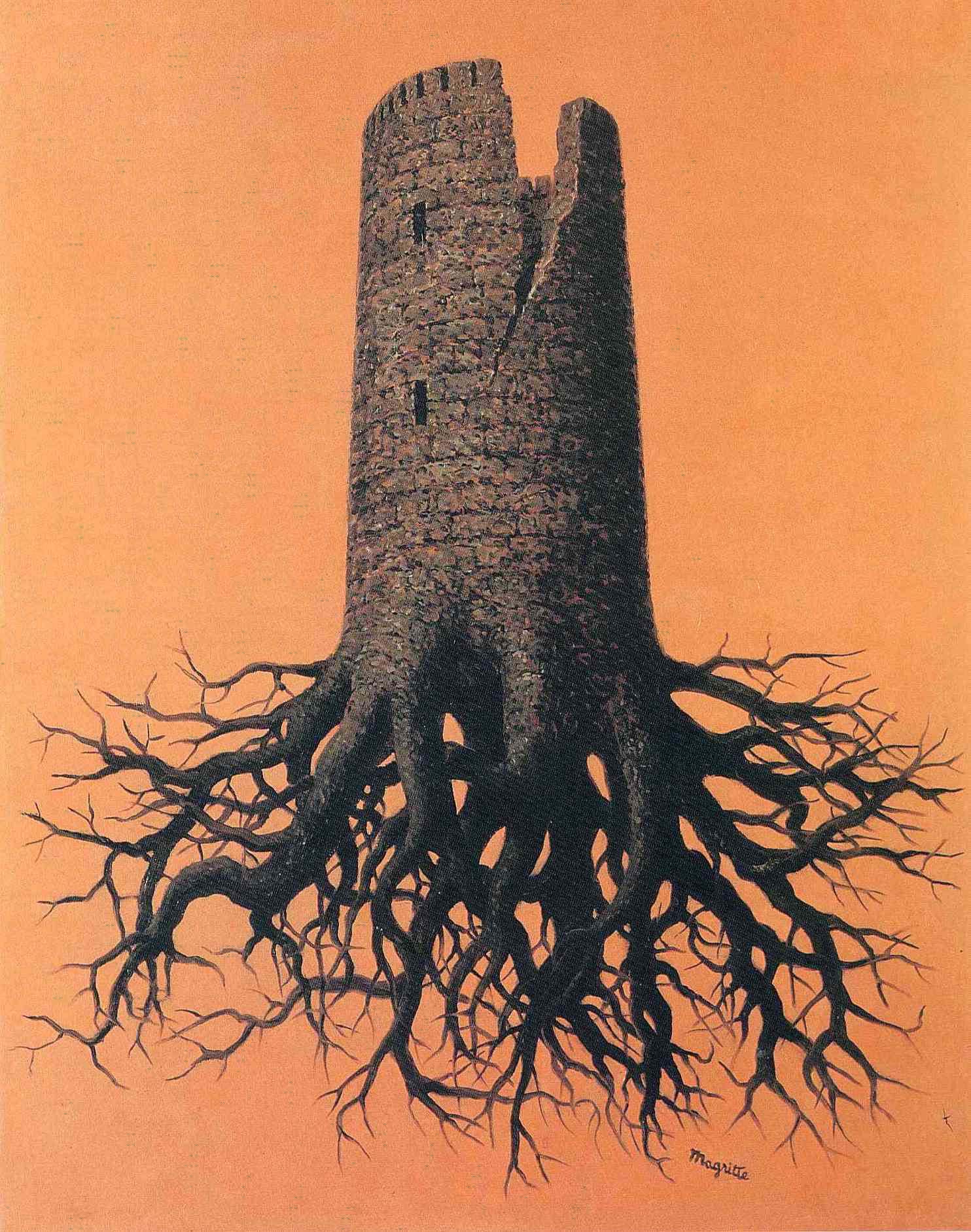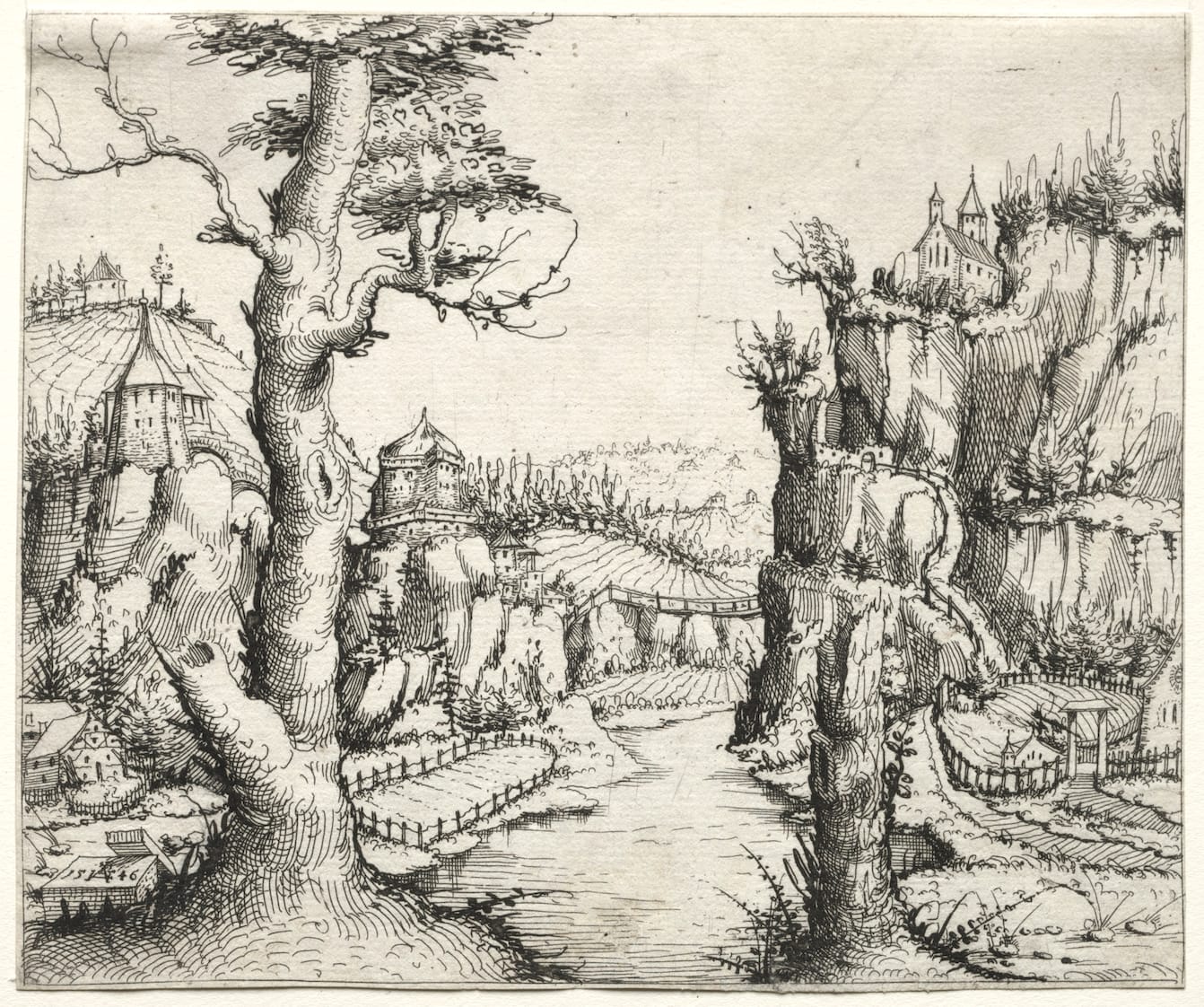Art: Almayer's folly (1951) by Rene Magritte, via wonderful Twitter bot.
The following story is a CC0-licensed contribution to my "open-source fiction" project Wanderverse, including the excerpts from other posts. I'm authorized to say so because I wrote all the material that was patched together into this rag quilt of a fable ☺️ I'm pretty pleased with it, and I hope that you will also enjoy sojourning through the whimsically grim Neverland that is the shared site of our ancestors' dreams (Jung, Campbell, you know the deal).
As usual, I'm wholeheartedly grateful to Sonya Supposedly members for supporting Wanderverse and my other creative projects. [excessive sentimental gushing redacted, and believe me it took discipline]
Without any further ado!
Tale of the Tinker
Today we concern ourselves with the man who dug the pattern into the earth, who gathered the stones and laid them to mark the twists. This he did with his heart and his hands.
The beginning is the labyrinth. The tinker built it on the spot where Elkatron used to be worshiped by the city of old. In his wanderings he happened upon that spot, and a psychosanth vision impelled him to make obeisance to the bereft behemoth. Generations hence, Aster tends it, and woodland creatures play about the subterranean queen, supping on her sloughings.
In the beginning the labyrinth was not the center of Wanderverse. Believe it or not, in those days Wanderverse had no center at all. But the man who would give it one had already been born.
He was not impressed with the world so far. It didn't meet his expectations. But that was fine since he'd never expected much of anything, making the expectations unmeetable. Nonetheless, this man was ambivalent about what he got.
He traipsed the land from town to village to hamlet to any other peculiar, particular small settlement. His own motives were pecuniary, after a fashion — the man was forever pursuing his fortune, which had slipped away up the road. Wistfully he recalled the days when it dogged him like a shadow.
This fellow's profession was traveling tinker, a jack of several trades who patched pots and pans, sharpened knives and axes, even did the simplest farrier jobs. He sold trinkets, brick-a-brack. Fancy candy made in molds, colorful like glass beads. And, tied up with string in crumpled kerchief bundles, a few arcane charms. But only if you struck him right when you asked.
The tinker bartered. He dickered. In between all of that he listened — listened with an open softness, absorbing snatches of gossip, family woes, the grim mesmer of renowned local campfire haunts, rumored portents, and singular dreams, be they sweet or unsettling. The tinker himself would pass along those tales he deemed fit to tell, especially any he'd heard twice over.
A certain story came first from a sturdy, surly farm wife. Later he heard it repeated by a jolly rendition of the same. It was like a lure, a temptation that snagged in his mind. The drama flashed bright in the corner of his eye as he rode long hours in the lurching cart, gazing ahead along the rough-hewn path that had been laboriously eked from brambled wilderness.
Lulled by his steady mule's gait and the motion of the vehicle, the tinker glimpsed the emerald shimmer of a peacock's tail and pondered what he'd heard about the Wailing Mother, the queen from ancient days who'd been worshiped by his ancestors.
Like Aster and Elka, the tinker had been a lover once. He was a man of specific passions, if only briefly. A simple romance, strawberry-sweet for the moment it lasted. He became besotted with the winsome daughter of a farmer on the outskirts of a rustic settlement.
When the tinker first arrived at the fateful farm, the master of the property — his soon-to-be-beloved's father — demonstrated the state of the animals' tack, what ought to be fixed, such sundries. The girl found reason to linger hither and thither. Her wide brown eyes brimmed with curiosity.
The farmer agreed that the tinker should stay on for a few days to mend the harnesses and other gear. He would cut leather to replace worn straps, tap in new brass rivets, and condition the traces.
Near noon on the first day of work, the farmer's daughter brought him an offering: crumbling, creamy white cheese, smothered in honey, piled atop a thick slice of bread. After placing the meal on his workbench, she ran her palms down the front of her apron.
He smiled, and looked up at her through his own watchful brown eyes, and thanked her.
That was enough. In a voice soft but eager, she began to pepper him with questions. This homespun maiden had eavesdropped merely snatches from the rest of the world, and she was dying to know more, determined to seize the opportunity to interview an outsider.
The tinker was sheepish. He could only boast of counties that he'd heard mentioned now and then since boyhood — places this girl had never visited, certainly, but the names were nothing to marvel at. The tinker had yet to range into lands unknown to his kin. But he would, he told her.
As he spoke to her, near evening, walking from the barn to the kitchen, he saw the gracious efficiency of her gait, how she stepped just so through the puddles and trampled straw. In a flash, the low sun emerged from behind a tree to wrap her in gold, making him squint. The tinker was entranced.
She imagines somewhere different
She imagines what different might be
But without the chance to taste it
She makes do with familiarity
Until he unpacks his magic bag
To exchange a gift for a gift
Ribbon red and husky laugh
The promise to tell
All she might wish
Have you had caramel?
Of course, she scoffs
But not, he counters, a cinnamon sweet
Well no, not that
Rare enough for a treat
Soon she finds he is different
From the usual fare on the farm
She wonders what if she went, too
Would that cause so much harm?
But Mama says, don't pin your hopes
On the man wandering here and away
He'll leave you swollen on a cold stoop
Or begging him always to stay
And Papa begins to rage
'Til he learns twas scarcely a kiss
Shaking his shaggy head
Lowering frightful fists
Child you must be careful
To guard our meager wealth
We cannot afford for you to mar
Your beauty or your health
Her father insisted that she must marry a man with land and livestock. Tearfully, but firmly swayed by her father's argument, the girl rejected the tinker.
That was the heartbreak he spoke into the forest. His innocence was badly damaged.
Those tumultuous months he bound up with twine like he used to pack the parcels of goods for his rucksack, in the earlier days of no cart, no horse. The tinker made to leave behind his carefully bundled memories. Just as he'd eventually abandoned that rucksack — not without ceremony, but definitively.
For years this was enough, that his hurts had been conveyed to the birds, the trees; his recollections woven through the lace shadows of leaves. Unburdened, he looked up and saw the sun. Felt its heat. He sweated, blinked, and continued.
The tinker idly slapped bugs as he walked. He heard each one of them sing during summer, along with the frogs, and owls calling to each other as they darted between the trees, or disappeared to midnight perches. He felt this intermittent symphony deeply, though he could not have expressed why.
Rarely the tinker would glimpse an owl gliding up high, thrown into relief by the moonlight. A reverse shooting star briefly snuffing out spots of white fire.
His sweetest hours of travel were unaware, spent as the light itself, the light and the air. His body flowed with the buoyancy that upholds a soaring hawk. Then he would come back to himself in a fishtail flash, grasping toward a dissipating cloud.
Confronted with such an interruption — or, when his campfire burned low, and the tinker lay tightly rolled in the good sturdy blanket that he cherished — he put his mind to the stories he'd heard. There were many, and a mosaic of fragments besides.
In one part of the land he'd traversed, they told again and again of Elkatron, the she-demon who favors few — only the bereaved and spurned — remaining pitiless toward the rest. The behemoth whose appetite is wickedly strong like the currents that will snatch a sailor, even the heartiest swimmer.
Some call her generous, but none says she is merciful.
Elka's husband was called away to fight, as were her two older boys, just sixteen; jaunty and jovial; gawky but strong. She reinforced their clothing with careful patches. Then she packed them off with nutty loaves of bread and an excessive quantity of good hard cheese.
That was all, it turned out. They were gone entirely. The war waned, eventually, but these three brave soldiers — one wary father, two eager young men — disappeared into battles unknown, noticed by no one able to carry back their names.
As the conflict petered out, nearing a ragged conclusion, Elka began learning how to mourn. She learned it looking into the bottom of the village well, down where the hidden water was cool and dark, swallowing her gaze. She dipped up her bitter dreams.
Then sickness afflicted the village, as often happens in times of strife. The triplets fell ill and one by one weakened, fading into fever, then died. Each was tenderly nursed on his deathbed by a heartbroken mother.
Elka's godhead is reawakened too late and she feels terrible survivor's guilt, a need that can never be slaked...

The Tinker's Tale
During his travels the tinker came upon a strange creature. Before him was a man who was half beast, with the branching antlers and long quizzical ears of a buck, but the face of a man, albeit covered in fine russet down. His features were forceful, the nose slightly hooked and the jaw firmly set. His torso and thighs were also that of a man, though they appeared to be timber, albeit covered with red fur, and he wore a breechcloth, but his calves and feet suited a deer. However, the rough split hooves were sturdier, broader, befitting the biped modality.
The tinker was surprised but not astonished. He was familiar with such encounters, having met others who related similar experiences. The tinker made a polite half-bow, inclining his head gravely, and began to continue along the path, intending to pass the creature. "I wish to go on my way, friend," he said softly but clearly, drawing closer to the stag-man.
"Certainly, in a moment," the stag-man replied, and replanted his hooves more widely. "First you must listen. I am an emissary of the one who occupies your dreams."
Now the tinker was astonished, not merely surprised. "I dream of no one, sir," he contended.
The stag-man smiled, and the expression looked peculiar on his stern face. "Then perhaps it is Elka who dreams of you." Before the tinker could reply, the stag-man began to sing.
It was not his own voice that issued forth, but a woman's throaty warble. "Villagers approach with stones," the stag-man sang, and the tinker shuddered.
Come with me and we'll sail this ship
to the furthest, farthest shore.
Hear the women moaning,
watch your father scowl.
Now clamber to the prow,
I'll unfurl the flag.
This vessel scarcely feels the drag,
she slices through the sea.
Sail, sail with me.
Sail, sail with me.
Now the stag-man chanted, fast and tuneless, still in that foreign feminine voice.
Don't look now,
got a knife to your throat.
Keep your eyes averted,
I'll tell you what I know.
The chase was concerted —
nice try with the boat.
Poor fool to think
you'd be able to sail free.
You're dabbling in piracy,
but I'm the vigilante.
Loading up my cannons,
I'll blow you off the deck.
Ain't afraid of Davy Jones,
won't hesitate at shipwreck.
Remember my blade
pressed against your jugular.
Did you think before you fled,
what might I do to her?
The stag-man fell silent.
"What does Elkatron want with me?" the tinker gasped. "I have never seen the sea."
Again a smile. "Neither have I," said Elkatron through her deputy. The stag-man stamped his left hoof, the ground heaved open, and the tinker fell through.
TO BE CONTINUED...





